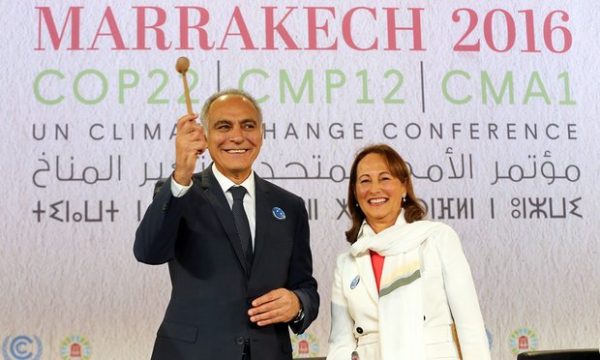
In a sign of how far the world has shifted in recognising the need to tackle global warming, Beijing — once seen as an obstructive force in UN climate talks — is now leading the push for progress by responding to fears that Mr Trump would pull the US out of the landmark accord.
“It is global society’s will that all want to co-operate to combat climate change,” a senior Beijing negotiator said in Marrakesh on Friday, at the first round of UN talks since the Paris deal was sealed last December. The Chinese negotiators added that “any movement by the new US government” would not affect their transition towards becoming a greener economy.
India also joined in the warnings, saying Mr Trump’s appointment would force countries to reassess an accord hailed as an end to the fossil fuel era.
“Everyone will rethink how this whole process is going to unfold,” India’s chief negotiator, Ravi Prasad, told the Financial Times.
Recalling the way support for the earlier Kyoto protocol climate treaty crumbled after it was abandoned by another Republican president, George W Bush, Mr Prasad said he feared the Paris accord could suffer “a contagious disease that spreads” if the US withdrew.
Mr Trump’s sweeping victory on Tuesday has shaken what had appeared to be an unstoppable bout of global action to tackle climate change in the run-up to the two-week Marrakesh talks, which began on Monday.
Governments struck the first climate deal for aviation in October, just days before agreeing to phase out planet-warming hydrofluorocarbon chemicals used in air-conditioners.
The Moroccan hosts of this week’s talks had been planning a celebratory meeting to cap this unprecedented bout of activity. Instead, organisers awoke on Wednesday morning to find the world’s wealthiest country had a president-elect who has called global warming a hoax, pledged to “cancel” the Paris agreement and vowed to stop US funding of UN climate programmes entirely.
“They were in absolute shock,” said one person who saw Moroccan officials on Wednesday morning.
Adnan Amin, the director-general of the International Renewable Energy Agency, said “a sense of helplessness” had pervaded the Marrakesh talks, and “a certain amount of fear”.
The EU and Japan also reaffirmed their commitment to the agreement, which requires all countries to come up with a plan to curb climate change in order to stop global temperatures from rising more than 2C from pre-industrial times.
But neither they nor China were willing to offer extra cuts in greenhouse gas emissions to fill the vacuum a US withdrawal would create, nor additional money for an agreement requiring billions of dollars in public and private funds to be channelled from rich to poor countries to tackle climate change.
At 3am in the morning I started to hear the [US election] results and I said, ‘No, you’re having a nightmare, go back to sleep’. When I got up and realised it was true, I walked around in a daze
A developing country participant
“If the US changes its position that would be very serious for us, especially the aspect of the finance,” said Shigeru Ushio, a Japanese foreign ministry official.
As delegates absorbed the ramifications of Mr Trump’s sweeping victory, many swapped stories of how the result had hit them.
“At 3am in the morning I started to hear the results and I said, ‘No, you’re having a nightmare, go back to sleep’,” said one developing country participant. “When I got up and realised it was true, this was really, really happening, I walked around in a daze. I think a lot of us were.”
The negotiations have continued nonetheless and some countries have been adamant that the US election result should not interfere with a meeting that is due to start negotiating a raft of important rules for how the Paris agreement will operate.
“We’re talking about the big challenge of climate change,” said Russia’s lead negotiator, Oleg Shamanov. “This issue is bigger than life. This is a long-term issue, longer than any mandate of any president of country X or Z, even if that country is a big one.”
The prospect of the US withdrawing from the Paris agreement has been a topic of endless discussion beneath the sun-shaded walkways in the temporary convention centre built for the Marrakesh meeting.
A pullout would take four years, unless Mr Trump chose to take the US out of the accord’s parent treaty, the 1992 UN Framework Convention on Climate Change, in which case it could only take a year.
That would be a highly provocative move, said international climate law expert, Farhana Yamin. “It would escalate non-cooperation to the highest level possible.”
But as the first week of the talks drew to a close, a mood of defiance was emerging among some delegates who said past US retreats from UN climate action had only spurred other countries’ determination to unify and proceed.
“The talk in the corridors is, ‘OK, this is not going to stop us from moving forward, we will just redouble our efforts’,” said Hugh Sealy, a lead negotiator for an alliance of small island countries.
“This is still an existential threat,” he said. “I still want to pass on that little house I have on the coast in Grenada to my children and the rest of us are going to have to step up.”
The Financial Times

Leave a Reply
You must be logged in to post a comment.